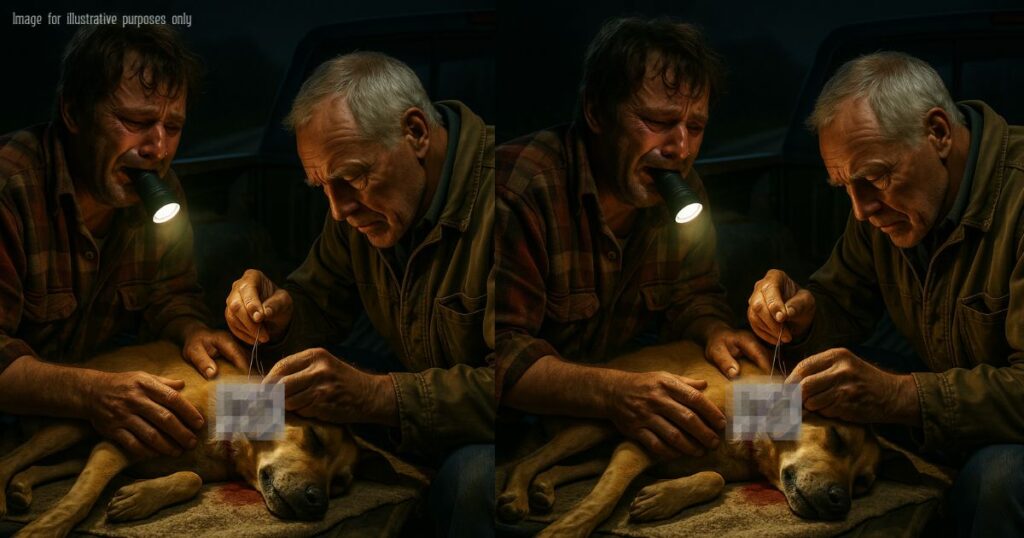Part 5 – The Cat No One Touched
She’d been in the shelter for 204 days. No one wanted her — not even to look. Until a man who never liked cats walked in and said, “I’ll take the mean one.”
We’d taken her in on a Monday, back in the spring of 2016.
Someone had stuffed her into a milk crate, left it outside the clinic door before dawn. No note, no name — just fur matted with dried blood and a pair of yellow eyes that said don’t touch me unless you want to bleed.
She couldn’t have weighed more than five pounds. Torn ear. Bald patches. And a low growl like the engine of a pickup that hadn’t run in years.
My techs called her Trouble.
I called her Tuesday, because that’s when I gave up trying to rehome her.
Nobody adopts cats like her.
They want kittens with big eyes and bows on their heads. Purring fluffballs who love belly rubs and Instagram filters.
They don’t want a half-feral senior with scars on her muzzle and a reputation for drawing blood.
She hissed at anyone who came near. Refused to eat if watched. Took up residence under the laundry counter, striking out like a rattlesnake if someone reached too fast.
But she never missed the litter box.
And when the lights were off, and everyone went home, she’d crawl onto the bench in the exam room and sleep where the sun hit the cushion.
We posted her photo. Ran promotions. “Adopt a hard-luck case.” Nobody bit.
After a while, we stopped trying.
She became part of the clinic. A ghost you learned to live with.
Techs left extra food. I let her have the run of the back hallway at night. And every now and then, when I sat late doing paperwork, she’d perch beside me, close enough to feel her warmth — but not close enough to touch.
We understood each other that way.
Neither of us had much patience for noise or nonsense.
Then came Henry Palmer.
He was seventy-three. A retired mechanic. His wife had passed the year before — cancer, sudden.
The man looked like someone had let all the air out of him. Stooped shoulders, tired eyes, hands like rusted pliers.
He came in for a box of flea medicine.
We talked a bit. Small stuff. Weather, the mayor’s kid wrecking his car again, price of gas.
And then he said, “You got any cats nobody wants?”
It stopped me cold.
“Why?” I asked.
He shrugged. “House is too quiet. Dog died last fall. I hate silence.”
I led him to the back.
Tuesday was crouched under a cabinet, watching us with suspicion.
Henry got down on one knee. Grimaced. “You the mean one?” he asked.
She growled.
He smiled. “Good. I don’t trust things that love too easy.”
She didn’t run. Didn’t move.
He extended a finger — not too close — and said, “Alright then. I’ll take her.”
I tried to explain the risks. The temperament. The chance she’d never warm up.
He cut me off.
“I ain’t lookin’ for a damn therapy cat. I’m lookin’ for company.”
Fair enough.
The first week, he called every day.
“She’s hidin’ in the dryer again.”
“She swatted my toast off the table. I didn’t even do nothin’.”
“She sat on my chest while I was napping and just stared.”
By week three, she had a name: Jolene.
By week six, he brought in a picture. Her curled on a windowsill, sunbeam hitting her just right, like she was halfway to forgiving the world.
He looked younger already. Or maybe just less alone.
Then one day, he didn’t call.
Didn’t show.
Didn’t come by for food, like he always did on Saturdays.
Something in my chest tightened.
I drove to his place.
Front porch light on. Car in the drive. No answer.
I knocked again. Then tried the handle.
It was unlocked.
I found him on the floor beside his recliner. Cold. Peaceful.
And there, curled against his chest like a stubborn apology, was Jolene.
She looked up at me once.
Didn’t hiss.
Didn’t move.
Just stayed there, as if keeping the silence warm until someone came.
The sheriff’s deputy told me Henry had written my name on a slip of paper in his wallet. “If anything happens, call Doc,” it said.
That’s how I ended up with Jolene again.
She didn’t eat for three days.
Didn’t hide. Didn’t growl. Just lay under the bench in the exam room and stared at nothing.
On the fourth day, I brought in Henry’s flannel jacket. Laid it beside her.
She curled up in it like it was the last solid thing in the world.
I kept her at the clinic after that.
Never tried to rehome her again.
She’d already done her job — given an old man his last season of meaning.
And I figured that earned her the right to rest.
She lived another year.
Died on a Thursday, just after lunch, curled up under the heat lamp.
I buried her in the back lot, under the cottonwood, wrapped in that same flannel jacket.
Some folks think it’s silly — grieving over a cat that clawed more than she cuddled.
But grief isn’t about who was easy.
It’s about who mattered.
And Jolene mattered.
Because she reminded me — and Henry — that even the unlovable are worthy of love.
Especially them.
People ask me sometimes what story I remember most.
They expect the dramatic ones.
The rescues. The surgeries. The miracles.
But I always think of Henry Palmer.
And the mean old cat who finally let herself be touched.
ENDING TRUTH:
Sometimes what we need isn’t affection.
It’s presence.
Not sweetness — but the chance to sit beside another scarred soul and say:
“I see you. You’re safe here.”
And for some of us, that’s more than enough.


